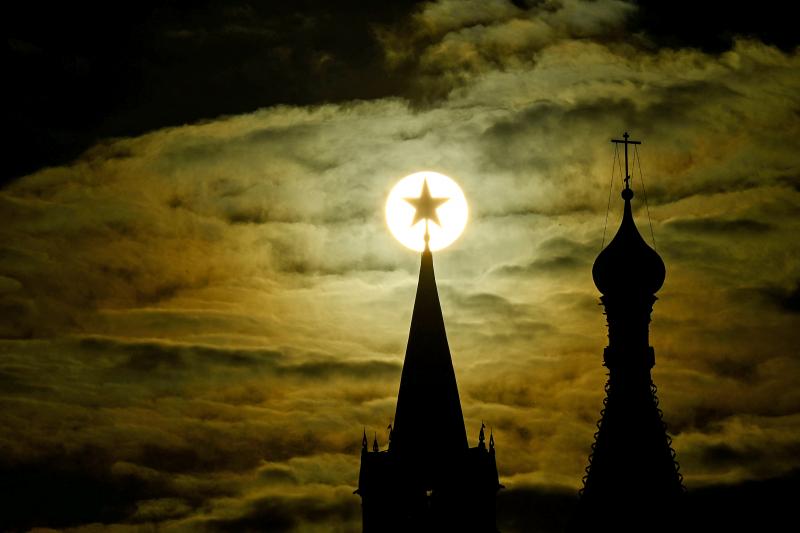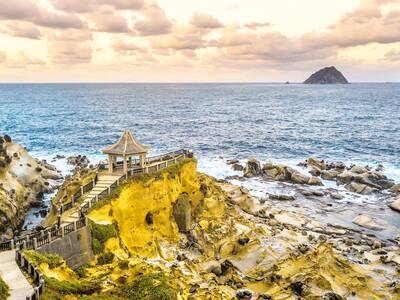Will there be nuclear war? Will Russia win the Ukraine offensive? Will my son survive?
As the Kremlin presses ahead with its military intervention in the pro-Western country, more and more Russians are turning to astrologers.
In Russia’s second city of Saint Petersburg, bespectacled Elena Korolyova receives clients in her apartment, where two cats prowl between piles of books.

Photo: AFP
“People want to know what will become of Russia, cut off from the rest of world,” the 63-year-old said.
Astrologers, psychics and mediums have for years been popular in Russia, and particularly turbulent years have seen demand for their services increase.
As the country reels from a barrage of unprecedented sanctions over Ukraine, more and more Russians are turning to astrology as they peer into the future.
Korolyova, a grey-haired philologist by training who rose to fame in the former imperial capital through word of mouth, seeks to reassure her clients.
She predicts that Moscow will not only survive the economic storm, but also emerge victorious.
“The global cataclysm will intensify in September, but Russia will come out of it stable and prosperous,” she said.
Korolyova charges 5,000 rubles (US$90) per consultation and says — without wanting to reveal any numbers — that since President Vladimir Putin sent troops into Ukraine on Feb. 24 requests from clients have increased. In the first week of the conflict, the number of searches for “astrologer” more than doubled on Russia’s main search engine Yandex — from 42,900 on Feb. 19 to 95,000 on March 5, according to the company’s keyword statistics.
POLITICAL ASTROLOGY
In Moscow, another prominent astrologer, Konstantin Daragan, who made a name for himself by claiming to have predicted the coronavirus pandemic, also says Russia will win on the ground in Ukraine and in its clash with the West.
“Russia will become the center of the world after the conflict,” he said on social media recently. Originally from Ukraine’s eastern region of Donbas that the Russian army has been seeking to conquer, the aeronautical engineer turned astrologer claims to have advised ministers, bankers and even members of Ukraine’s secret services in the past. Having left for Moscow after pro-Western authorities came to power in Kyiv in 2014, he supports the Russian military intervention, even if his hometown of Lysychansk has been ravaged by fighting.
For him, too, business is booming. His “School of Classical Astrology” doubled its student numbers since Putin launched the Ukraine intervention, now counting around 200 in Moscow.
STAR WARS
Sociologist Alexei Levinson of the independent Levada research center said that an attempt to read the stars is a way of making sense of reality for many “confused” Russians.
“Faced with a universe that has collapsed, some prefer to take stars as guides rather than their leaders,” he said. “Astrology today is a kind of psychotherapy or new religion.”
Anna Markus, one of Daragan’s students in her 50s, said she looks to the stars for “logic in events on Earth.”
“Russia is designated as the only culprit of the conflict, but it is obvious that a third country is the real culprit,” she said.
She has a star chart that she claims proves the US is guilty.
Over the border in battered Ukraine, the stars, predictably, show the opposite. Astrologer Vlad Ross, who is popular in Ukrainian media, says that Putin is “gravely ill” and “will not survive past March 2023.”
“Saturn is the sign of Russia against Uranus, the sign of Ukraine. Our victory is imminent,” assured another star Ukrainian astrologer, Angela Pearl, in a video viewed more than a million times since mid-May.
Desperate Ukrainians are turning to astrologers for a sign that their loved ones on the front will survive or if they will have to flee advancing Russian troops.
Ukrainians want to know “if nuclear war will happen, if they should leave their country, if their loved ones are in danger”, astrologer Olena Umanets said.
“Russia will explode in March 2023,” predicted the 38-year-old former musician, who fled Ukraine for Switzerland. Her US$100 online consultation reassured one client, a 46-year-old television producer in Kyiv named Kristina, worried about her husband who is fighting on the frontline.
“My husband just called me. He thanks God for having survived the night,” she wrote to her astrologer in June. “Thank you for having encouraged me to pray for him, it relieved me to share this responsibility with the stars.”

The low voter turnout for the referendum on Aug. 23 shows that many Taiwanese are apathetic about nuclear energy, but there are long-term energy stakes involved that the public needs to grasp Taiwan faces an energy trilemma: soaring AI-driven demand, pressure to cut carbon and reliance on fragile fuel imports. But the nuclear referendum on Aug. 23 showed how little this registered with voters, many of whom neither see the long game nor grasp the stakes. Volunteer referendum worker Vivian Chen (陳薇安) put it bluntly: “I’ve seen many people asking what they’re voting for when they arrive to vote. They cast their vote without even doing any research.” Imagine Taiwanese voters invited to a poker table. The bet looked simple — yes or no — yet most never showed. More than two-thirds of those

In the run-up to the referendum on re-opening Pingtung County’s Ma-anshan Nuclear Power Plant last month, the media inundated us with explainers. A favorite factoid of the international media, endlessly recycled, was that Taiwan has no energy reserves for a blockade, thus necessitating re-opening the nuclear plants. As presented by the Chinese-language CommonWealth Magazine, it runs: “According to the US Department of Commerce International Trade Administration, 97.73 percent of Taiwan’s energy is imported, and estimates are that Taiwan has only 11 days of reserves available in the event of a blockade.” This factoid is not an outright lie — that

Former Chinese Nationalist Party (KMT) chairwoman Hung Hsiu-chu’s (洪秀柱) attendance at the Chinese Communist Party’s (CPP) “Chinese People’s War of Resistance Against Japanese Aggression and the World Anti-Fascist War” parade in Beijing is infuriating, embarrassing and insulting to nearly everyone in Taiwan, and Taiwan’s friends and allies. She is also ripping off bandages and pouring salt into old wounds. In the process she managed to tie both the KMT and the Democratic Progressive Party (DPP) into uncomfortable knots. The KMT continues to honor their heroic fighters, who defended China against the invading Japanese Empire, which inflicted unimaginable horrors on the

Sitting on a bus bound for Heping Island (和平島), at the start of my first visit to Keelung in years, I was hell-bent on visiting a place of considerable historical interest, even though I knew that it wasn’t officially open to the public. In 2011, archaeologists working in the densely populated southern half of the island unearthed the foundations of the Convento de Todos los Santos (Convent of All Saints, 諸聖教堂), a Catholic house of worship established during Spain’s 1624-1642 occupation of northern Taiwan. I’d heard about its rediscovery a while ago, but it wasn’t until I read a scholarly